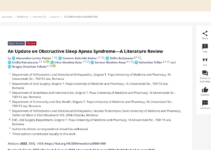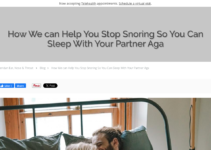Title: The Link Between Diet and Snoring: How Certain Foods Contribute to Sleep Apnea
Introduction:
Snoring is a common occurrence during sleep, but when it becomes chronic, it may be a sign of a more serious condition known as sleep apnea. Sleep apnea is characterized by interrupted breathing during sleep, which can lead to a decrease in oxygen intake and disrupt the quality of sleep. While lifestyle changes such as quitting smoking, losing weight, and avoiding alcohol can help reduce snoring, dietary choices also play a significant role. Certain foods can exacerbate snoring by increasing mucus production and triggering inflammation in the nasal passages. In this article, we will explore the connection between diet and snoring, providing insights into which foods to avoid and which ones to incorporate into your diet to alleviate snoring symptoms.
Understanding Sleep Apnea and Its Consequences:
Sleep apnea is a condition that obstructs breathing during sleep, leading to reduced oxygen intake and disrupted sleep patterns. It can result in excessive daytime sleepiness, cognitive impairments, mood disturbances, and an increased risk of serious medical conditions such as hypertension, diabetes, and cardiovascular diseases. Snoring is one of the common symptoms of sleep apnea, and chronic snoring should not be ignored as it may indicate an underlying sleep disorder.
The Role of Diet in Snoring:
Diet plays a crucial role in snoring and sleep apnea. Certain foods can worsen snoring by increasing mucus production and triggering inflammation in the nasal passages. Dairy products such as yogurt, cheese, and ice cream contain lactose, which can contribute to mucus production and aggravate snoring. Similarly, processed sugars found in sweets, cookies, desserts, and soft drinks can cause inflammation in the throat and nasal passages, leading to snoring. Wheat-based products, including bread and pastries, can also contribute to inflammation and mucus production.[0] Additionally, fatty cuts of meat can trigger phlegm production, leading to snoring.
Recommended Dietary Changes:
To reduce snoring and alleviate sleep apnea symptoms, it is recommended to make certain dietary changes. Avoiding dairy products, processed sugars, wheat-based products, and fatty cuts of meat before bedtime can help reduce the production of mucus and inflammation in the airways. Instead, incorporate anti-inflammatory foods such as vegetables, fruits, salmon, nuts, avocados, and olive oil into your diet.[1] These foods can help prevent blockages in the airways and sinuses, allowing for better airflow during sleep.[2]
Other Lifestyle Changes:
In addition to dietary changes, several other lifestyle modifications can help reduce snoring and improve sleep quality. Quitting smoking and losing excess weight can significantly alleviate snoring symptoms.[1] Avoiding alcohol before bed is also crucial, as it can cause disruptions in sleep patterns. Sleeping on your side rather than your back can also help prevent snoring.
When to Seek Professional Help:
While lifestyle changes can help reduce snoring, it is essential to seek professional help if snoring persists or is accompanied by other symptoms of sleep apnea, such as excessive daytime sleepiness, morning headaches, or difficulty concentrating. Consulting a sleep physician or a dentist specializing in sleep medicine can provide a proper diagnosis and guide you toward appropriate treatment options, such as a snoring mouth guard or continuous positive airway pressure (CPAP) therapy.[3]
Conclusion:[4]
Snoring can be a disruptive and frustrating issue, but it is essential to recognize its potential connection to sleep apnea. By making dietary changes, such as avoiding dairy products, processed sugars, wheat-based products, and fatty cuts of meat, and incorporating anti-inflammatory foods into your diet, you can reduce snoring and alleviate sleep apnea symptoms. Additionally, adopting a healthy lifestyle, including quitting smoking, losing weight, and avoiding alcohol, can further improve sleep quality and overall well-being. If snoring persists or is accompanied by other symptoms, seeking professional help is crucial for an accurate diagnosis and appropriate treatment. Remember, a good night's sleep is crucial for your health and quality of life.
0. “Stop snoring immediately by ditching five popular foods from your …” www.dailyrecord.co.uk, 9 Sep. 2023, https://www.dailyrecord.co.uk/lifestyle/health-fitness/stop-snoring-immediately-ditching-five-30831715
1. “Avoiding six foods can help you stop snoring, experts say – Wales …” www.walesonline.co.uk, 9 Sep. 2023, https://www.walesonline.co.uk/news/health/avoiding-six-foods-can-help-27539545
2. “Five foods to ditch from diet to stop snoring instantly, according to …” www.mirror.co.uk, 9 Sep. 2023, https://www.mirror.co.uk/news/health/five-foods-ditch-diet-stop-30826186
3. “Signs You Have Sleep Apnea” www.matthewsfamilydentistry.com, 9 Sep. 2023, https://www.matthewsfamilydentistry.com/blog/signs-you-have-sleep-apnea/
4. “The Link Between Sleep Apnea and Glaucoma” www.precision-eye.com, 9 Sep. 2023, https://www.precision-eye.com/blog/the-link-between-sleep-apnea-and-glaucoma





